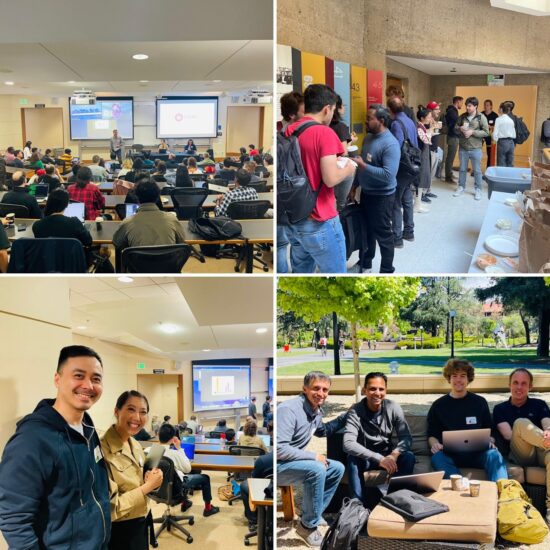CodeX Hosts First-Ever Hackathon Focused on Law and Large Language Models
The halls of Stanford Law School (SLS) buzzed with conversations and coding on May 20 when approximately 150 people gathered for what is believed to be the world’s first hackathon at the intersection of law and Large Language Models such as ChatGPT.
The 12-hour-long engineering, brainstorming, and collaboration session brought together an interdisciplinary group of participants for the groundbreaking event, which grew out of the recent FutureLaw conference, an annual, industry-leading event organized by CodeX – the Stanford Center for Legal Informatics. CodeX, jointly operated by SLS and the Stanford Computer Science Department, focuses on the development of computational law, the branch of legal informatics concerned with the mechanization of legal reasoning.

Pierre-Loic Doulcet, a CodeX Fellow and computational contract engineer at French multinational insurance company AXA, got the idea for the hackathon after FutureLaw wrapped up in mid-April. “Some of the most exciting discussions at FutureLaw focused on Large Language Models, which will play a transformative role in law,” Doulcet siad. “I participate often in hackathons all over the world, and nobody has yet organized one specialized on LLMs applied to the law. I thought we should build on the energy of FutureLaw by hosting what we believe to be the world’s first hackathon at the intersection of LLMs and the law.”
The CodeX team pulled together the public event in just over two weeks. Approximately 40 teams formed in advance and at the event to compete in technical and non-technical tracks. Prizes included cash awards and, in some cases, assignments to mentors to help the winning teams bring their ideas to market. Participants ranged from Stanford law, computer science, and engineering students to legal and technical industry professionals.

SLS student Jesse Shulman, JD ’23, participated with a team of engineers to create a product they dubbed Devil’s Advocate, designed to help litigators test, visualize, and receive feedback on their arguments in advance of submitting a brief or arguing before a court. “We parsed messy, unstructured legal case files and made artificial intelligence agents into ‘lawyers’ that could critique arguments and counter-arguments, then give feedback on how the initial arguments could be improved,” said Shulman who is working to launch his own legal AI company. “AI can transform legal practice even more than Microsoft Word, email, and legal research databases like Westlaw and LexisNexis changed lawyers jobs in the past,” Shulman said.
CodeX Fellow Jay Mandal, chief operating officer at SAP and a hackathon participant, wrote a blog for the CodeX website about the hackathon, saying, “Not since my days back at Apple during the iPhone years have I witnessed such promise for the next revolutionary ecosystem of game-changing ideas and companies in all verticals.”
CodeX Fellow and Assistant Director, Megan Ma agreed. “We were really struck by the enthusiasm and energy. One law firm flew in a team to participate. We had participants and judges from a huge swath of areas, from venture capitalists to AI professionals from Google.”
Other ideas and tools generated by the finalists included:
- An automated contract negotiation tool in which independent generative AI agents act as the two opposing parties and a moderator in order to negotiate specific terms;
- A 3D avatar of a lawyer verbally conversing with users, and able to answer basic legal questions;
- Automated creation of pre-populated legal complaints for lawyers that draw upon news, reports and social media posts about a recent major event adversely impacting a population;
- A solution to evaluate transparency on every corporation’s compliance with salary disclosure laws to ensure applicants have full transparency on salary ranges;
- Two query and summarization tools for high-volume document due diligence, and for pdfs of depositions/court documents; and
- A tool, built by a 16-year-old coder, that gives an individual immediate access to prior relevant case law and other data in order to help legally underrepresented minorities and economically disadvantaged segments avoid coerced guilty pleas.
Ma said the hackathon likely will become an annual event, perhaps held as part of FutureLaw. “We see this as a real trailblazing event and look forward to what the future holds,” she said.
About CodeX
CodeX – The Stanford Center for Legal Informatics is jointly operated by Stanford Law School (SLS) and the Stanford Computer Science Department. CodeX‘s emphasis is on the research and development of computational law, the branch of legal informatics concerned with the mechanization of legal reasoning. The center allows researchers, lawyers, entrepreneurs, and technologists to work side by side to advance the frontier of legal technology, bringing new levels of legal efficiency, transparency, and access to legal systems around the world.
About Stanford Law School
Stanford Law School is one of the nation’s leading institutions for legal scholarship and education. Its alumni are among the most influential decision makers in law, politics, business, and high technology. Faculty members argue before the Supreme Court, testify before Congress, produce outstanding legal scholarship and empirical analysis, and contribute regularly to the nation’s press as legal and policy experts. Stanford Law School has established a model for legal education that provides rigorous interdisciplinary training, hands-on experience, global perspective, and focus on public service, spearheading a movement for change.
